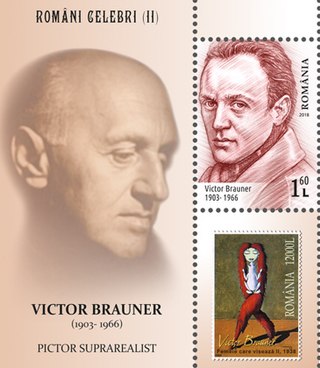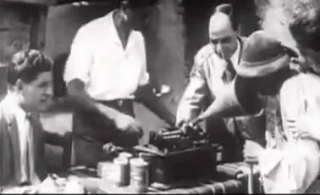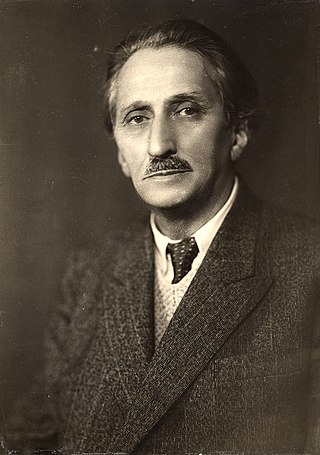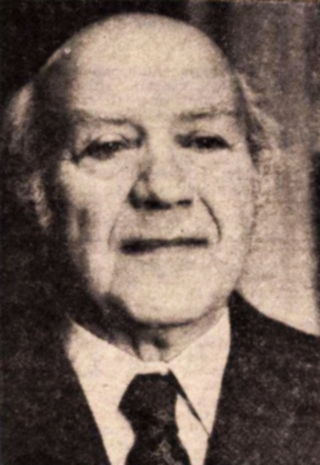
Harry Brauner (24 February 1908 – 11 March 1988) was an ethnomusicologist, composer, and professor of music from Romania.

Harry Brauner (24 February 1908 – 11 March 1988) was an ethnomusicologist, composer, and professor of music from Romania.
Brauner was born in Piatra Neamț into a Jewish family with many children, including his elder brother, Victor, who became a noted painter and sculptor of the Surrealist movement. He moved in 1913 to Vienna with his family, where they stayed for two years. [1] When they returned to Romania, they lived first in Brăila, and later in Bucharest. There he studied at the Music Academy, having as teachers, among others, Constantin Brăiloiu, Dumitru Georgescu Kiriac, and Ștefan Popescu. In 1927, he was named secretary of the Composers' Society's so-called Folklore Archives. [1]
Brauner was one of those who discovered Romanian folk music diva Maria Tănase in the mid-1930s. [1] He eventually became her official biographer.
During World War II, he was a teacher at a Jewish high school in Bucharest, in 1944 he became music adviser at the Romanian Radio Broadcasting Company in charge of folklore, and in 1949 he became head of the Folklore Department at the Music Academy in Bucharest. [1]
Brauner was implicated in the show trial against Lucrețiu Pătrășcanu, and spent 12 years in prison, most of it in solitary confinement. He was released from Aiud Prison in January 1962, [2] sent into internal exile to a village near Slobozia. He married Lena Constante in 1964. In 1966, he was allowed to travel to the Venice Biennale, Italy, where his brother Victor Brauner exhibited some of his works at the French pavilion. [1]
In 1967, after being named a member of the Paris Music Biennale, he was allowed to travel to Paris, where he became acquainted with Marc Chagall. In 1968, both he and Lena Constante were rehabilitated and given a meager pension for their sufferings. [1]
A close collaborator of Constantin Brăiloiu, Brauner recorded about 5,000 Romanian folk songs. [3] He died in 1988 in Bucharest.
Vintilă Horia was a Romanian writer, winner of the Prix Goncourt. His best known novel is God Was Born in Exile (1960).

Victor Brauner was a Romanian painter and sculptor of the surrealist movement.

Spiru C. Haret was a Romanian mathematician, astronomer, and politician. He made a fundamental contribution to the n-body problem in celestial mechanics by proving that using a third degree approximation for the disturbing forces implies instability of the major axes of the orbits, and by introducing the concept of secular perturbations in relation to this.
Alecu Russo was a Romanian writer, literary critic and publicist.
Paul Constantinescu was a Romanian composer. Two of his main influences are Romanian folk music and Byzantine chant, both of which he used in his teaching. One of his students was composer Margareta Xenopol.

Barbu Ștefănescu Delavrancea; pen name of Barbu Ștefan; April 11, 1858 – April 29, 1918) was a Romanian writer and poet, considered one of the greatest figures in the National awakening of Romania.

Lena Constante was a Romanian artist, essayist, and memoirist, known for her work in stage design and tapestry. A family friend of Communist Party politician Lucrețiu Pătrășcanu, she was arrested by the Communist regime following the conflict between Pătrășcanu and Gheorghe Gheorghiu-Dej. She was indicted in his trial and spent twelve years as a political prisoner.
Manya Botez (1896–1971) was a Romanian pianist and children's music teacher.

Ion Alion Buzdugan was a Bessarabian-Romanian poet, folklorist, and politician. A young schoolteacher in the Russian Empire by 1908, he wrote poetry and collected folklore emphasizing Bessarabia's links with Romania, and associated with various founding figures of the Romanian nationalist movement, beginning with Ion Pelivan. Buzdugan was a far-left figure during the February Revolution, but eventually rallied with the National Moldavian Party in opposition to the socialists and the Bolsheviks. He vehemently supported the union of Bessarabia with Romania during the existence of an independent Moldavian Democratic Republic, and, as a member of its legislature, worked to bring it about. Threatened by the Bolsheviks, he fled to Romania and returned with an expeditionary corps headed by General Ernest Broșteanu, being one of the delegates who voted for the union, and one of dignitaries who signed its proclamation.

Constantin Brăiloiu was a Romanian composer and internationally known ethnomusicologist.

Alexandru Slătineanu was a Romanian bacteriologist, civil servant, and art collector. From an aristocratic and intellectual background, he embraced socialism while studying in Paris in the 1890s, becoming a lifelong associate of the socialist physician Ioan Cantacuzino. Slătineanu served his country in the Second Balkan War and World War I, creating a medical infrastructure designed to combat cholera and typhus, and improving immunology research. His laboratory continued to set the national standard in the field of bacteriology during the interwar years.

Barbu Lăzăreanu was a Romanian literary historian, bibliographer, and left-wing activist. Of Romanian Jewish background, he became noted for both his social criticism and his lyrical pieces while still in high school, subsequently developing as a satirist and printing his own humorous magazine, Țivil-Cazon. Lăzăreanu's youthful sympathies veered toward the anarchist underground, prompting him to associate with Panait Mușoiu. At that stage of his life, he participated in a bakers' strike, and encouraged peasants to resist encroachment by the landowners.
Stephan Roll was a Romanian poet, editor, film critic, and communist militant. An autodidact, he played host to the Romanian avant-garde at his father's dairy shop, publishing his work in short-lived reviews and in two volumes of poetry. As one of the editors of the magazine unu, he turned from Constructivism, Futurism and jazz poetry to the more lyrical format of Surrealism. Roll's political radicalism seeped into his avant-garde activity, and produced a split inside the unu group; Roll's faction discarded Surrealism in favor of proletarian literature, and affiliated with the underground Romanian Communist Party.

Radu D. Rosetti or Rossetti was a Romanian poet, playwright, and short story writer, also distinguished as an attorney and activist. The son of playwright-aristocrat Dimitrie Rosetti-Max and nephew of Titu Maiorescu, he had a troubled and rebellious youth, split between Romania and Austria-Hungary; during these debut years, he kept company with senior literary figures such as Ion Luca Caragiale and Alexandru Vlahuță. Graduating from the University of Bucharest at age 26, he was already a successful poet of neoromantic sensibilities, a published translator of plays and novels, and also famous for his unhappy marriage to the literary critic Elena Bacaloglu. Rosetti then switched to writing social-themed plays and stories of his professional life, earning a high profile as a defender of left-wing causes and impoverished clients. He traveled extensively and to exotic locations, publishing a number of volumes detailing his experiences.

Anton Berindei was a Wallachian-born Romanian soldier.
Constantin N. Brăiloiu was a Wallachian and Romanian politician.

Doina, or Doină, is a political poem by the Romanian Mihai Eminescu. It was first published in 1883 and is therefore seen by some as Eminescu's final work in verse, although it may actually be an 1870s piece, inspired or enhanced by the perceived injustice of the Berlin Treaty. A variation of the doina, picked up from Romanian folklore, it is noticeably angry to the point of rhetorical violence, a radical expression of Romanian nationalism against invading "foreigners", with additional hints of ecopoetry and "anti-technicist" discourse. Doina delineates the ideal geographical space of Greater Romania, at a time when Romanian-inhabited regions were divided between an independent kingdom and multinational empires. Its final lines call on Stephen the Great, depicted as a sleeping hero, to take up the cause of Romanians and chase foreigners out with the sound of his horn. The same basic themes appear in another poem by Eminescu, the anthem-like La arme, which is sometimes discussed as a variant of Doina.

Dan Simonescu was a Romanian literary historian, bibliographer, folklorist, and librarian. His debut was in his late teens, when he accompanied Constantin Rădulescu-Codin during fieldwork in Muscel County, publishing his first contributions in the field of Romanian folklore. After graduating from the University of Bucharest in 1925, and publishing his first book, a collection of articles, in 1926, he became an assistant professor at his alma mater, and was also employed as a librarian by the Romanian Academy. Simonescu joined an editorial team headed by senior scholars Ioan Bianu and Nicolae Cartojan, and, in the 1930s and 1940s, became a major contributor to the collection and publication of old Romanian literature; he was also Cartojan's disciple, though the two disagreed on a parallel project, namely the publication of Mihail Kogălniceanu's collected works, with Simonescu favoring, and eventually putting out, a topical selection of Kogălniceanu's social-themed essays. His own first major contributions were his doctoral thesis, which explored court ceremonials in the Danubian Principalities, and a paper on the emergence of historiography in Early Modern Romania.
Viorel Cosma was a Romanian musician and teacher who came to wider prominence as an exceptionally prolific musicologist and a pioneering lexicographer. Through his scholarship he also achieved distinction as a teacher, researcher and music critic. Between 1989 and 2012 he produced a ten volume lexicon, running to 2,800 pages, entitled "Muzicieni din România", providing extensive information on approximately 1,500 Romanian composers and musicians, musicologists, music critics, music teachers, folklorists and other contributors to Romanian music and musicianship.
Ionel Budișteanu was a renowned Romanian violinist, conductor and musical arranger, of Roma ethnicity, often called "the lord of Romanian popular music".